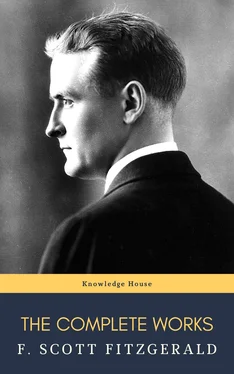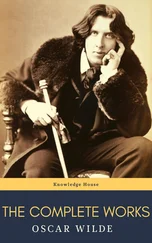Knowledge house - The Complete Works of F. Scott Fitzgerald
Здесь есть возможность читать онлайн «Knowledge house - The Complete Works of F. Scott Fitzgerald» — ознакомительный отрывок электронной книги совершенно бесплатно, а после прочтения отрывка купить полную версию. В некоторых случаях можно слушать аудио, скачать через торрент в формате fb2 и присутствует краткое содержание. Жанр: unrecognised, на английском языке. Описание произведения, (предисловие) а так же отзывы посетителей доступны на портале библиотеки ЛибКат.
- Название:The Complete Works of F. Scott Fitzgerald
- Автор:
- Жанр:
- Год:неизвестен
- ISBN:нет данных
- Рейтинг книги:3 / 5. Голосов: 1
-
Избранное:Добавить в избранное
- Отзывы:
-
Ваша оценка:
- 60
- 1
- 2
- 3
- 4
- 5
The Complete Works of F. Scott Fitzgerald: краткое содержание, описание и аннотация
Предлагаем к чтению аннотацию, описание, краткое содержание или предисловие (зависит от того, что написал сам автор книги «The Complete Works of F. Scott Fitzgerald»). Если вы не нашли необходимую информацию о книге — напишите в комментариях, мы постараемся отыскать её.
The first table of contents (at the very beginning of the ebook) lists the titles of all novels included in this volume. By clicking on one of those titles you will be redirected to the beginning of that work, where you'll find a new TOC that lists all the chapters and sub-chapters of that specific work.
The Complete Works of F. Scott Fitzgerald — читать онлайн ознакомительный отрывок
Ниже представлен текст книги, разбитый по страницам. Система сохранения места последней прочитанной страницы, позволяет с удобством читать онлайн бесплатно книгу «The Complete Works of F. Scott Fitzgerald», без необходимости каждый раз заново искать на чём Вы остановились. Поставьте закладку, и сможете в любой момент перейти на страницу, на которой закончили чтение.
Интервал:
Закладка:
As the unfortunate upshot of this conversation, they took Dick’s advice literally, and two days later went out to Rye, where they wandered around with an irritated real estate agent, like bewildered babes in the wood. They were shown houses at a hundred a month which closely adjoined other houses at a hundred a month; they were shown isolated houses to which they invariably took violent dislikes, though they submitted weakly to the agent’s desire that they “look at that stove—some stove!” and to a great shaking of doorposts and tapping of walls, intended evidently to show that the house would not immediately collapse, no matter how convincingly it gave that impression. They gazed through windows into interiors furnished either “commercially” with slab-like chairs and unyielding settees, or “home-like” with the melancholy bric-à-brac of other summers—crossed tennis rackets, fit-form couches, and depressing Gibson girls. With a feeling of guilt they looked at a few really nice houses, aloof, dignified, and cool—at three hundred a month. They went away from Rye thanking the real estate agent very much indeed.
On the crowded train back to New York the seat behind was occupied by a super-respirating Latin whose last few meals had obviously been composed entirely of garlic. They reached the apartment gratefully, almost hysterically, and Gloria rushed for a hot bath in the reproachless bathroom. So far as the question of a future abode was concerned both of them were incapacitated for a week.
The matter eventually worked itself out with unhoped-for romance. Anthony ran into the living room one afternoon fairly radiating “the idea.”
“I’ve got it,” he was exclaiming as though he had just caught a mouse. “We’ll get a car.”
“Gee whiz! Haven’t we got troubles enough taking care of ourselves?”
“Give me a second to explain, can’t you? just let’s leave our stuff with Dick and just pile a couple of suitcases in our car, the one we’re going to buy—we’ll have to have one in the country anyway—and just start out in the direction of New Haven. You see, as we get out of commuting distance from New York, the rents’ll get cheaper, and as soon as we find a house we want we’ll just settle down.”
By his frequent and soothing interpolation of the word “just” he aroused her lethargic enthusiasm. Strutting violently about the room, he simulated a dynamic and irresistible efficiency. “We’ll buy a car to-morrow.”
Life, limping after imagination’s ten-league boots, saw them out of town a week later in a cheap but sparkling new roadster, saw them through the chaotic unintelligible Bronx, then over a wide murky district which alternated cheerless blue-green wastes with suburbs of tremendous and sordid activity. They left New York at eleven and it was well past a hot and beatific noon when they moved rakishly through Pelham.
“These aren’t towns,” said Gloria scornfully, “these are just city blocks plumped down coldly into waste acres. I imagine all the men here have their mustaches stained from drinking their coffee too quickly in the morning.”
“And play pinochle on the commuting trains.”
“What’s pinochle?”
“Don’t be so literal. How should I know? But it sounds as though they ought to play it.”
“I like it. It sounds as if it were something where you sort of cracked your knuckles or something…. Let me drive.”
Anthony looked at her suspiciously.
“You swear you’re a good driver?”
“Since I was fourteen.”
He stopped the car cautiously at the side of the road and they changed seats. Then with a horrible grinding noise the car was put in gear, Gloria adding an accompaniment of laughter which seemed to Anthony disquieting and in the worst possible taste.
“Here we go!” she yelled. “Whoo-oop!”
Their heads snapped back like marionettes on a single wire as the car leaped ahead and curved retchingly about a standing milk-wagon, whose driver stood up on his seat and bellowed after them. In the immemorial tradition of the road Anthony retorted with a few brief epigrams as to the grossness of the milk-delivering profession. He cut his remarks short, however, and turned to Gloria with the growing conviction that he had made a grave mistake in relinquishing control and that Gloria was a driver of many eccentricities and of infinite carelessness.
“Remember now!” he warned her nervously, “the man said we oughtn’t to go over twenty miles an hour for the first five thousand miles.”
She nodded briefly, but evidently intending to accomplish the prohibitive distance as quickly as possible, slightly increased her speed. A moment later he made another attempt.
“See that sign? Do you want to get us pinched?”
“Oh, for Heaven’s sake,” cried Gloria in exasperation, “you always exaggerate things so!”
“Well, I don’t want to get arrested.”
“Who’s arresting you? You’re so persistent—just like you were about my cough medicine last night.”
“It was for your own good.”
“Ha! I might as well be living with mama.”
“What a thing to say to me!”
A standing policeman swerved into view, was hastily passed.
“See him?” demanded Anthony.
“Oh, you drive me crazy! He didn’t arrest us, did he?”
“When he does it’ll be too late,” countered Anthony brilliantly.
Her reply was scornful, almost injured.
“Why, this old thing won’t go over thirty-five.”
“It isn’t old.”
“It is in spirit.”
That afternoon the car joined the laundry-bags and Gloria’s appetite as one of the trinity of contention. He warned her of railroad tracks; he pointed out approaching automobiles; finally he insisted on taking the wheel and a furious, insulted Gloria sat silently beside him between the towns of Larchmont and Rye.
But it was due to this furious silence of hers that the gray house materialized from its abstraction, for just beyond Rye he surrendered gloomily to it and re-relinquished the wheel. Mutely he beseeched her and Gloria, instantly cheered, vowed to be more careful. But because a discourteous street-car persisted callously in remaining upon its track Gloria ducked down a side-street—and thereafter that afternoon was never able to find her way back to the Post Road. The street they finally mistook for it lost its Post-Road aspect when it had gone five miles from Cos Cob. Its macadam became gravel, then dirt—moreover, it narrowed and developed a border of maple trees, through which filtered the weltering sun, making its endless experiments with shadow designs upon the long grass.
“We’re lost now,” complained Anthony.
“Read that sign!”
“Marietta—Five Miles. What’s Marietta?”
“Never heard of it, but let’s go on. We can’t turn here and there’s probably a detour back to the Post Road.”
The way became scarred with deepening ruts and insidious shoulders of stone. Three farmhouses faced them momentarily, slid by. A town sprang up in a cluster of dull roofs around a white tall steeple.
Then Gloria, hesitating between two approaches, and making her choice too late, drove over a fire-hydrant and ripped the transmission violently from the car.
It was dark when the real-estate agent of Marietta showed them the gray house. They came upon it just west of the village, where it rested against a sky that was a warm blue cloak buttoned with tiny stars. The gray house had been there when women who kept cats were probably witches, when Paul Revere made false teeth in Boston preparatory to arousing the great commercial people, when our ancestors were gloriously deserting Washington in droves. Since those days the house had been bolstered up in a feeble corner, considerably repartitioned and newly plastered inside, amplified by a kitchen and added to by a side-porch—but, save for where some jovial oaf had roofed the new kitchen with red tin, Colonial it defiantly remained.
Читать дальшеИнтервал:
Закладка:
Похожие книги на «The Complete Works of F. Scott Fitzgerald»
Представляем Вашему вниманию похожие книги на «The Complete Works of F. Scott Fitzgerald» списком для выбора. Мы отобрали схожую по названию и смыслу литературу в надежде предоставить читателям больше вариантов отыскать новые, интересные, ещё непрочитанные произведения.
Обсуждение, отзывы о книге «The Complete Works of F. Scott Fitzgerald» и просто собственные мнения читателей. Оставьте ваши комментарии, напишите, что Вы думаете о произведении, его смысле или главных героях. Укажите что конкретно понравилось, а что нет, и почему Вы так считаете.












